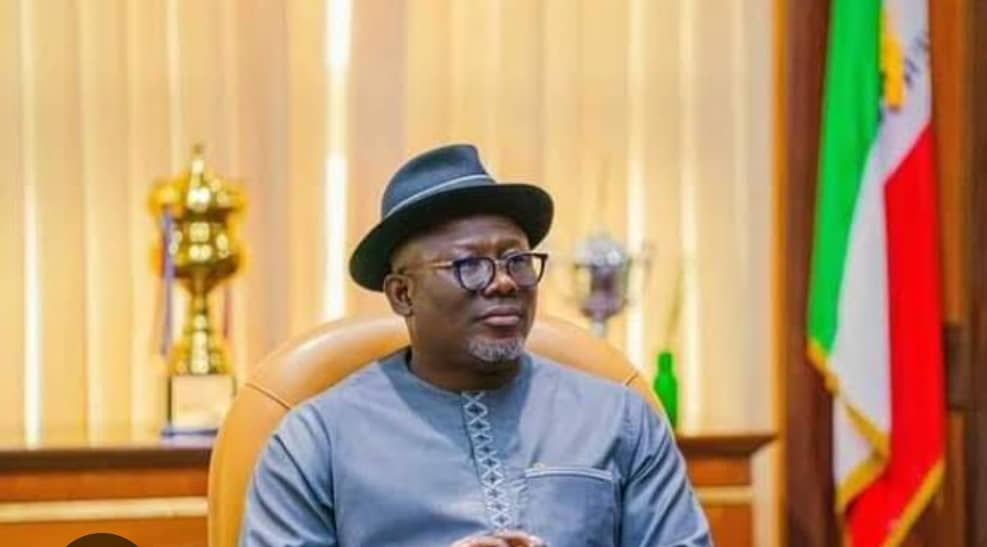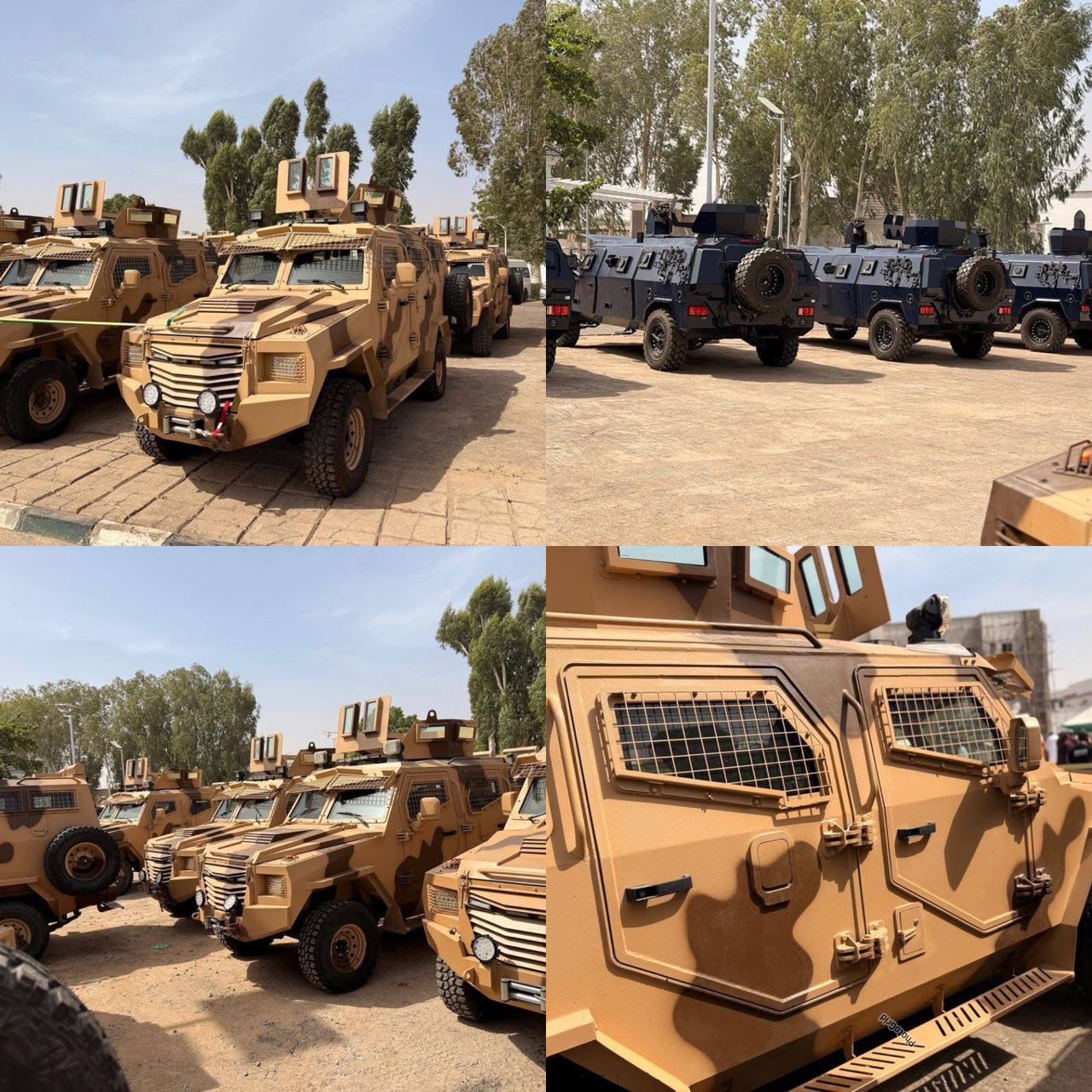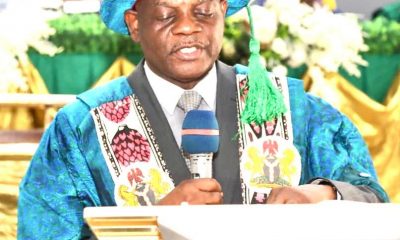society
Did You Approve Boarding Fee Hike In Technical Schools, Delta Parents Ask Governor Oborevwori

Did You Approve Boarding Fee Hike In Technical Schools, Delta Parents Ask Governor Oborevwori
Parents of students in Delta State-owned Technical schools are seeking to verify if Governor Sheriff Oborevwori is aware of a recent hike in boarding fees from ₦85,000 to ₦250,000 per term.
The parents said that they are asking in view of the fact that there is no justification for the sharp hike, especially when Federal Government Colleges, some private schools as well as the Delta State-owned model secondary schools charge far less.
They also highlighted their concerns, citing the financial hardship that the hike has thrown them into.
In an open appeal, the parents asked the governor to clarify whether the fee increase was approved by his office or implemented by the Ministry of Technical Education without his consent. They also pointed out that the state owned government model secondary schools and colleges charge N60,000 while some private schools in the state capital, Asaba, charge ₦150,000, while similar schools in Lagos charge around ₦100,000 as boarding fees.
“We are struggling to understand why the state technical schools are demanding such a high amount. Federal Government Colleges charge ₦85,000 and even the State Government Model schools like Nana Government College Ughelli and others charge N60,000. We are even surprised that the best private schools in Asaba charge less than what is now being asked of us,” said a concerned parent.
A teacher from Ofagbe Technical School, speaking anonymously, expressed concern over recent fee increases imposed by the Ministry of Technical Education. He noted that the annual fee for junior and senior classes rose from N1,850 to N3,400, along with an additional compulsory N15,000 for medical and administrative charges. He also noted that prents are struggling to meet these new financial demands, leading many to withdraw their children from the school.
The teacher lamented that this situation disproportionately affects poorer families, who are already facing economic hardships. He added that although Delta State is supposed to provide free education in line with the Universal Basic Education Commission (UBEC) guidelines, the recent fee hikes contradict this promise, even as students are forced to pay for textbooks and medical services.
According to him, the unfortunate situation has led to a decline in enrolment numbers as families opt for other public secondary schools with lower fees, which range from N1,700 to N2,700. The teacher emphasized that the current educational policies seem to cater more to the middle class, risking a crisis in the educational sector.
Master Ochuko Favour, a young boy who recently completed his primary education, shared his disappointment at being unable to pursue his dream of attending technical school due to the financial burden. He revealed that he will settle for a local government secondary school. His plight highlights the systemic barriers that many students face in accessing education.
Also, a recent circular from the Ministry of Technical Education, dated September 17, 2024, has sparked concern over increased levies for students in government technical schools. While some fees align with those approved for public secondary schools, many stakeholders are questioning specific charges, particularly for students in JSS 1-3 and Pre-Vocational classes. These include a N2,000 administrative charge, a N3,000 medical fee introduced last academic year, a termly sports levy, and the mandatory purchase of Mathematics and English textbooks solely from the school.
Parents and stakeholders argue that these fees contravene the Compulsory, Free Universal Basic Education Act of 2004, which exempts students in the Basic Education Cohort from paying for government-provided services. They maintain that there is a pressing need for the state government to clarify the rationale behind these fees, as many view them as disguised tuition charges.
The situation is particularly concerning given that other states are actively working to improve their technical education systems and increase enrolment. The community is calling on the Delta State government to investigate the Ministry of Technical Education’s policies, suggesting that these changes may disproportionately burden low-income families and contradict the broader educational goals of the administration. The perception is that the ministry is prioritizing revenue collection over the needs of students and the community, which could undermine the vision for equitable education in the state.
A parent of a female student who gained admission to the school has decided to reject the offer in favor of a public model secondary school in Warri with boarding facilities. She cited lower fees and essential amenities as key reasons for her choice. Concerned about her child’s safety and the lack of basic facilities like electricity and water, she questioned why she should pay N250,000 for boarding when the school’s resources seemed inadequate. She expressed frustration over the Ministry’s failure to ensure the schools are functioning properly despite significant investments in its infrastructure.
Beyond the financial burden, the parents also raised concerns about the deplorable conditions of some of the technical schools. Reports from various institutions in the state reveal overcrowded classrooms, lack of electricity, and facilities and in some of the new model technical schools workshops and laboratories are now being converted into makeshift classrooms without adequate furniture. Parents who visited the schools said there was no official available to address their concerns.
“The classrooms are overcrowded, and there’s no light. Our children are not getting the education they deserve despite the high fees. When we visited to clarify the situation, there was no one to speak with us,” lamented Mr. Joseph Ighotegwolor, a concerned parent.
The parents also questioned why the Ministry of Technical Education continues to admit new students despite the existing lack of space and facilities to accommodate them. They urged the governor to intervene, fearing that the Ministry are more focused on increasing revenue than providing quality education as the Ministry of Basic and Secondary Education is not left out in this revenue drive by conducting supplementary entrance examination into the state model schools whereas most of the classrooms in the schools are already overcrowded.
Adding to their concerns, the parents highlighted a policy that forces students in the various technical schools who fail their promotion examination to leave the school without giving them the opportunity to repeat the classes. Many see this as an unfair practice, particularly in an environment that is not conducive to learning.
“Instead of helping students improve, they are asked to leave if they fail their exams. This is not right. These are young students who deserve support, not expulsion,” said Mrs. Amaka Udeh, a parent from Effurun.
The parents called on Governor Oborevwori to urgently investigate the fee increase, address the challenges affecting the technical schools, while ensuring their children receive a quality education.
Meanwhile, the recent policy change by the Ministry of Technical Education mandating entrance exams for all technical schools, including the six conventional ones, has created significant barriers for prospective students. Previously, these conventional schools accepted students without an entrance exam, making them accessible to a broader demographic.
With the entrance exam requirement, many students, especially those from lower-income backgrounds who struggle with funding, are unable to compete for admission. This situation has forced them to continue in regular public secondary schools, potentially limiting their vocational training opportunities and future career prospects.
Advising the government, the parents noted that adressing this issue may require revisiting the admissions policy to ensure that all students have equitable access to technical education, possibly by providing financial support for exam preparation and related costs or by reinstating more inclusive admission criteria for conventional schools.
society
Good Politics Or Just Power? Two Years After The Elections

Good Politics Or Just Power? Two Years After The Elections
Two years after the last general election, Nigerians are justified in asking a direct question: is our democracy stronger today than it was then? Democracy is not measured by how many offices a party controls or how loudly politicians speak. It is measured by integrity, accountability, and the lived experience of the people. Good Politics demands more than victory at the polls; it demands moral leadership and visible progress in the lives of citizens.
The debate over amendments to the Electoral Act should have provided an opportunity to deepen transparency and strengthen public confidence. Instead, hesitation to fully embrace reforms that safeguard credible vote transmission and accountability has fueled doubt. In a nation where electoral credibility remains fragile, any reluctance to reinforce safeguards sends the wrong signal. Good Politics stands firmly for processes that are open, fair, and beyond suspicion.
The party in power commands significant authority across the federation. With control of the presidency, many state governments, a strong presence in the National Assembly, and influence at local levels, there should be no anxiety about reforms that ensure free and fair elections. Confidence in leadership is demonstrated not by dominance, but by a willingness to subject power to scrutiny. Politics rooted in the omoluabi ethos embraces fairness, transparency, and responsibility, even when inconvenient.
This is the standard long associated with Awolowo, whose politics emphasized discipline, social welfare, education, and institutional strength. His vision was not merely about holding office, but about transforming society through principled governance. Good Politics follows that tradition. It rejects manipulation, arrogance, and the concentration of power without accountability. It insists that authority must serve the people, not itself.
Beyond electoral reforms, democracy must deliver tangible relief. Across the country, households struggle with rising prices and shrinking purchasing power. Small businesses are burdened by escalating costs. Young people search for opportunities that remain scarce. When economic hardship deepens, democracy feels abstract. Good Politics recognizes that political legitimacy is reinforced when citizens can see and feel the benefits of governance.
The concentration of power within a single political structure should translate into coordinated reform and measurable development. When it does not, questions naturally arise. Democracy weakens when dominance replaces performance. It weakens when loyalty to party eclipses loyalty to principle. The omoluabi tradition teaches that character defines leadership. Without character, authority becomes hollow.
A healthy democracy requires credible elections and compassionate governance. It requires leaders who understand that politics is a moral enterprise. Two years into this administration, many Nigerians remain uncertain about the direction of both our democratic processes and their daily welfare. If democracy is to endure, it must reflect Good Politics: fairness in competition, integrity in conduct, and compassion in governance. Anything less falls short of the standard that our history and our values demand.
news
GEN CHRISTOPHER GWABIN MUSA SUPPORT INITIATIVE COMMENDS STATE-FEDERAL COLLABORATION IN ZAMFARA

GEN CHRISTOPHER GWABIN MUSA SUPPORT INITIATIVE COMMENDS STATE-FEDERAL COLLABORATION IN ZAMFARA
The Gen Christopher Gwabin Musa Support Initiative (GCGMSI) has commended the Zamfara State Government for its decisive contribution to security operations through the donation of newly acquired armoured personnel carriers (APCs), surveillance drones, and other critical operational equipment to troops and security agencies in the state.
This commendation was contained in a statement signed by the Convener of the GCGMSI, Ibrahim Dahiru Danfulani, Sadaukin Garkuwan Keffi/Betara Biu, and made available to the press.
The equipment was formally commissioned on Wednesday, February 18, by the Grand Patron of the GCGMSI and Minister of Defence, General Christopher Gwabin Musa, OFR (rtd.), in a ceremony at the Government House, Gusau. The event was attended by senior military officers, heads of security agencies, and top officials of the Zamfara State Government.
The GCGMSI, in its statement, hailed the donation as a “transformative and timely intervention” that aligns perfectly with its core objective of advocating for and supporting tangible measures that enhance the operational capacity and welfare of Nigeria’s security forces. The Initiative praised Governor Dauda Lawal’s administration for moving beyond rhetoric to actionable, material support, describing the move as a “blueprint for state-level collaboration in national security.”
“The provision of these assets by the Zamfara State Government is a testament to visionary leadership and a profound commitment to the peace and stability of its people,” the GCGMSI statement read. “It represents the exact kind of synergistic partnership between state and federal authorities that the GCGMSI champions. This initiative will significantly close operational gaps, boost the confidence of our gallant troops, and send a strong message to criminal elements.”
Speaking at the commissioning, General Musa emphasized that sustained collaboration is indispensable in confronting the nation’s evolving security challenges. He specifically commended Governor Lawal for his proactive support.
“Governor Dauda Lawal has demonstrated exemplary leadership and an unwavering dedication to the security of Zamfara State,” the Defence Minister stated. “The provision of these armoured vehicles, surveillance drones, and other operational equipment will undoubtedly boost the morale and operational effectiveness of our troops and other security agencies on the ground. This is a commendable effort that should be emulated by others.”
The newly commissioned assets, which include multiple APCs and advanced surveillance drones, are expected to dramatically enhance the mobility, protection, intelligence-gathering, and rapid response capabilities of security forces, particularly in the state’s remote and difficult terrains where anti-banditry operations are ongoing.
In his remarks, Governor Lawal reiterated his administration’s steadfast commitment to being a reliable partner in the security architecture. He urged security agencies to deploy the new resources responsibly and effectively to safeguard lives and property.
The Federal Government, through the Ministry of Defence, reaffirmed its commitment to continuing and deepening such partnerships with state governments across the nation to strengthen coordination and resource allocation in the collective fight against insecurity.
The GCGMSI concluded its statement by urging other state governments to take a cue from Zamfara’s “bold and pragmatic” approach, affirming that such concrete support is vital for achieving lasting peace and security across Nigeria.
society
Governor Dauda Lawal Commissions 25 Armoured Personnel Carriers, Aerial Surveillance Drones to Combat Insecurity

Governor Dauda Lawal Commissions 25 Armoured Personnel Carriers, Aerial Surveillance Drones to Combat Insecurity
In a major boost to the fight against banditry and insecurity in Zamfara State and the North-West Zone, Zamfara State Governor, His Excellency, Dr Dauda Lawal, on Wednesday commissioned 25 new Armoured Personnel Carriers (APCs) and sets of surveillance drones for the military and other security agencies operating in the state.
The event, which took place in Gusau, was part of the state government’s ongoing effort to provide structured logistical support to frontline security forces and combat insurgency, banditry, and protect lives and properties. Speaking at the commissioning and handover, Governor Lawal emphasised that the new assets are intended to enhance troop protection during high-risk deployments and improve rapid response capabilities in remote communities, ensuring tactical battle and overhead surveillance for victory.
“We have provided over 600 specialised motorcycles, 150 Hilux vehicles, and 20 Buffalo vehicles to our security forces. These 25 highly sophisticated APCs being commissioned today are therefore part of a broader reform to improve response to security threats. The APC’s significantly improves troop protection during deployments into high-risk areas. They reduce vulnerability during patrols, support convoy security along major routes, and strengthen rapid response capability when distress calls arise from remote communities.” the Governor stated.
Governor Lawal explained that the security challenges of recent years had disrupted farming, limited trade, and undermined public confidence across the state. He noted that his administration’s “Rescue Mission” agenda has focused on moving from fragmented responses to structured reforms, including the establishment of a Zamfara State Security Trust Fund and the operationalisation of Community Protection Guards to improve grassroots intelligence.
The Governor specifically highlighted the importance of integrating modern technology into security operations. He noted that the newly acquired drones would expand aerial surveillance, improve situational awareness, and support better coordination between command centres and troops in the field.
“Real-time information strengthens decision-making and reduces operational blind spots,” he added.
Governor Lawal however acknowledged the critical role of the Federal Government under President Bola Ahmed Tinubu, noting that recent federal budgets have allocated over three trillion naira to defence, a commitment he said strengthens subnational stabilisation efforts.
He urged the military commanders and personnel receiving the equipment to ensure disciplined maintenance and intelligence-guided deployment. “Enhancing your safety enhances the safety of our communities,” he told the troops.
Governor Lawal also told the people of Zamfara that; his administration remains resolute in restoring enduring security and peace across every Local Government Area. “We will sustain preventive measures, strengthen patrol architecture in rural corridors, deepen inter-state intelligence collaboration across the North-West, and maintain fiscal prudence in security expenditure. Stabilisation will continue through structured planning, lawful enforcement, and institutional reform.”
The Governor also linked the security investment to economic recovery, stressing that stability in rural areas is essential for agricultural productivity, market activity, and food security.
The event was attended by the Honourable Minister of Defence, General Christopher Musa (Rtd.), who formally commissioned the assets for operational service. Governor Lawal reaffirmed his administration’s resolve to sustain preventive measures and inter-state security collaboration until lasting peace is restored across all Local Government Areas in Zamfara.
-

 celebrity radar - gossips6 months ago
celebrity radar - gossips6 months agoWhy Babangida’s Hilltop Home Became Nigeria’s Political “Mecca”
-

 society6 months ago
society6 months agoPower is a Loan, Not a Possession: The Sacred Duty of Planting People
-

 society5 months ago
society5 months agoReligion: Africa’s Oldest Weapon of Enslavement and the Forgotten Truth
-

 news6 months ago
news6 months agoTHE APPOINTMENT OF WASIU AYINDE BY THE FEDERAL GOVERNMENT AS AN AMBASSADOR SOUNDS EMBARRASSING








